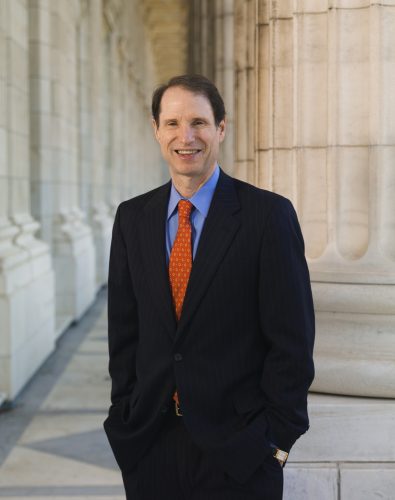
Sen. Ron Wyden says he was worried he was going to be too tired for his 998th town hall in Columbia County held remotely. Although his upcoming town halls are held remotely, Wyden flew into Oregon late early in the morning of Feb. 18 after staying up all night in Washington DC for a late Senate vote.
When Wyden arrived for the town hall meeting, he says his worries ceased. “I got to the town hall, and I said, ‘I feel invigorated. I can keep going.’”
Wyden cites town halls in Oregon, where local residents raise issues and ask questions about policies, as a way to keep his finger on the pulse of the state. Town halls are what led to him passing the Secure Rural Schools legislation in 2000, and it’s where he says he learns about issues where he can step in as a senator to resolve administrative issues.
Wyden says he had his first town hall meeting in Fossil, Wheeler County in winter 1996. He called Wheeler County Court Judge Jeanne Burch and introduced himself. “I promised one in every county, and I’m the guy from the city, wished I could’ve played in the NBA and I’d like to start my town hall meetings in Wheeler,” he says. “I wanted to say that I’m not the U.S. senator of Portland but of every county.”
He says that Burch was surprised that a Democrat wanted to have his first town hall meeting in a county where you could count on one hand how many people voted for him. That first town hall meeting is what led to him introducing the Secure Rural Schools and Community Self-Determination Act, he says. The Secure Rural Schools law provides money to county governments in lieu of the money from timber sales on federal lands, according to a Wyden 2021 press release on updating the bill.
“It’s brought Oregon more than $3 billion for roads, schools and law enforcement,” Wyden says. “It’s probably the biggest authorization of funds that Oregon’s got.”
More than 20 years later, Wyden says the biggest difference at town halls is that there’s an increased presence of political polarization and partisanship. “We now have TV to appeal to the most partisan voices, interest groups,” he says.
But he says when he talks about bipartisan support for bills, that gets the conversation going at town hall meetings.
According to a press release from Wyden’s office, he has held 970 in-person town halls. When the COVID-19 pandemic began, he shifted to a virtual platform.
Wyden says the most important legislation he’s working on right now is related to mental health, and he’s received bipartisan support from Republican Sen. Mike Crapo of Idaho. “We’re going to get a big bipartisan set of reform,” he adds.
Mental health issues have been an issue in the U.S. before the pandemic, Wyden says, but it’s even worse today. He says he’s already accomplished something on addressing mental health with his CAHOOTS bill. CAHOOTS in Eugene is funded by law enforcement, he says, but his bill secured $1 billion in funding through Medicaid. The bill passed as part of the American Rescue Plan without any votes from Republican senators.
Wyden says town halls are where he learns about community issues that he can resolve through his position as chair of the U.S. Senate Finance Committee.
The Newport News-Times reported that the Internal Revenue Service was going to remove five households. The residents were living on the property when Andrew Aaron Lloyd of Lebanon purchased the property through misused pandemic relief loans.
“The IRS wanted to take the property back and didn’t want to adhere to the tenant protection laws in Oregon,” Wyden says. “It’s not just legislation, but it’s stepping in with the agency. I called the head of the Internal Revenue Service and that’s what I ought to be doing — I’m the chair of the Senate Finance Committee.”
With the 2022 midterm not too far away, Wyden says he’s confident that the Senate will make a big move for the Biden administration: approving Biden’s pick to replace U.S. Supreme Court Justice Stephen Breyer. “The president is going to name someone who will be sufficiently supported,” he says. “There are at least three people who have strong support and maybe more.”
Wyden’s 1,000th town hall will be virtual but will be hosted in Lane County, where residents will have priority to participate. He says having so many town halls is “a real monument” to a grassroots involvement in the Oregon government. “Nobody thought anyone could do this and when I said I would do it, everyone said there would be no way,” he says. “Newspapers said there would be no way Ron Wyden could do it and if he started, there would be no way he could keep it going.”
Wyden’s 1,000th town hall is 2:30 pm, Thursday, Feb. 24, and will be streamed via Facebook.